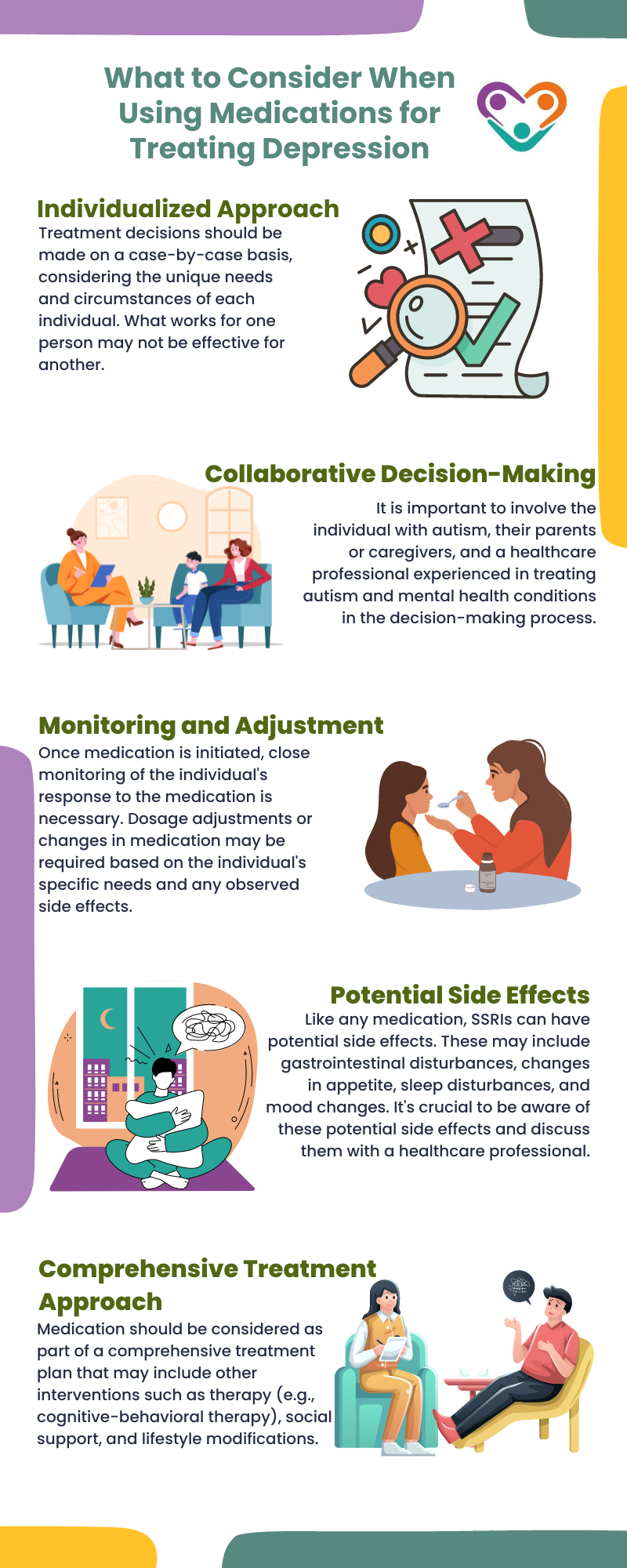Understanding how autism and sadness are connected can be a bit complex, but it’s important for grasping the emotional experiences of people on the autism spectrum.
Autism is a condition that affects how people think, feel, and interact with the world. For some individuals with autism, sadness can be a common emotion, but it might show up differently than it does in others.
This article explores why people with autism might feel sad, how they express their sadness, and what can be done to support them.
Prevalence of Depression in Autism
Research suggests that almost half of adults with autismwill experience depression at some point in their lives. This statistic highlights the high risk that individuals with autism face in developing depression.
Autistic individuals have a lifetime rate of depression that is nearly 4 times greater than that of the general population.
A 2015 study revealed that only about half of autistic individualswho took their own lives had been diagnosed with depression, indicating that depression often goes undetected in this population.
Moreover, research found that autistic children are 28 times more likely to have suicidal thoughts or a suicide attemptcompared to their non-autistic peers. These alarming statistics emphasize the urgent need to address depression within the autistic community.

Unique Challenges in Diagnosing Depression
Diagnosing depression in individuals with autism can be particularly challenging.
Autistic individuals may present with atypical symptoms or have difficulty expressing their emotions, making it harder to recognize signs of depression. Additionally, depression in autism is closely linked to features of anxiety, further complicating the diagnostic process.
The overlap between autism symptoms and depressive symptomscan also contribute to the underdiagnosis of depression in autistic individuals.
For example, social withdrawal or communication difficulties, which are core features of autism, may be mistakenly attributed solely to autism rather than underlying depression.
To ensure early detection and appropriate intervention, it is crucial for healthcare professionals and caregivers to be vigilant in monitoring the emotional well-being of individuals with autism.
Impact of Depression on Individuals with Autism
Depression is a significant concern for individuals with autism, as it can have a profound impact on their overall well-being and quality of life. Understanding the relationship between depression and autism symptoms is essential to provide appropriate support and intervention.
Depression in autism can exacerbate existing symptoms and features of autism. It can lead to increased social withdrawal, agitation, aggression, self-harm behaviors, sleep disturbances, psychomotor retardation, and changes in weight and appetite.
These depressive symptoms can significantly impact daily functioning and quality of life for individuals with autism.
Moreover, depression in autistic individuals can have far-reaching consequences on their overall quality of life. It can contribute to a decline in social interactions, academic or occupational performance, and overall well-being. Autistic individuals with depression may struggle with maintaining relationships, pursuing educational or career goals, and engaging in activities they once enjoyed.
Moreover, depression in autism often requires additional support and intervention. It may increase the need for medication and therapeutic interventions to address both the symptoms of depression and the core symptoms of autism.
Caregivers of individuals with autism and depression also face increased stress and may require additional support to ensure the well-being of their loved ones.
Given the heightened risk of suicide among autistic individuals, it is crucial to recognize and address depression in this population. Early detection and intervention are key to improving outcomes and reducing the impact of depression on individuals with autism.
Treatment Approaches for Depression in Autism
Fortunately, there are several evidence-based approaches that can help improve mental well-being for autistic individuals who are experiencing depression. Each approach offers unique strategies and techniques to address the challenges associated with depression in the autism community.
Let’s look at each of them.

Cognitive-behavioral therapy (CBT)
Cognitive-behavioral therapy (CBT) is a widely used and effective treatment approach for depression in individuals with autism. CBT focuses on identifying and modifying negative thought patterns and behaviors to alleviate depressive symptoms.
Through structured sessions, therapists help individuals develop coping skills and strategies to challenge and reframe negative thoughts.
In the context of autism, CBTcan be adapted to address specific challenges and support the unique needs of individuals on the spectrum. It aims to improve emotional regulation and enhance problem-solving abilities.
Mindfulness-Based Therapy
Mindfulness-based therapy is another approach that has gained recognition for its effectiveness in treating depression in individuals with autism.
This therapy involves cultivating awareness and acceptance of one’s thoughts, emotions, and sensations. By practicing mindfulness techniques, individuals can develop greater self-awareness and learn to respond to negative thoughts and emotions in a more adaptive way.
Mindfulness-based therapy can be particularly beneficial for individuals with autism who may experience sensory sensitivities and difficulties with emotional regulation.
Social and Vocational Skills Programs
Depression in individuals with autism can be exacerbated by challenges in social interactions and difficulties in finding and maintaining employment. Social and vocational skills programs focus on enhancing social and workplace skills, which can help individuals with autism build meaningful connections and gain independence.
These programs provide structured interventions and training sessions to develop social communication skills, problem-solving abilities, and workplace etiquette.
By improving social and vocational skills, individuals with autism can experience increased self-confidence, enhanced social interactions, and greater opportunities for employment. These positive outcomes can contribute to improved mental well-being and a reduced risk of depression.
Pharmacological Treatment Options
Pharmacological interventions can be considered as part of a comprehensive treatment plan for treating depression in individuals with autism. One commonly prescribed class of medications for depression is selective serotonin reuptake inhibitors (SSRIs).
That said, it’s important to note that medication use should be evaluated on a case-by-case basis, considering the specific needs and circumstances of each individual.
SSRIs are a type of antidepressant medication that works by increasing the levels of serotonin, a neurotransmitter associated with mood regulation, in the brain. These medications are commonly prescribed to individuals with depression, including those with autism.
While SSRIs have been found to be effective in treating depression in the general population, their efficacy in individuals with autism is less clear.
Research studies have shown mixed results regarding the effectiveness of SSRIs in treating depression specifically in individuals with autism. Some studies suggest that SSRIs may be beneficial in reducing depressive symptoms, while others show limited or no significant improvement.
Considerations for Medication Use
When considering the use of medication for treating depression in individuals with autism, it’s essential to carefully weigh the potential benefits against the potential risks and side effects.
Here are some key considerations to keep in mind:

Understanding and managing depression and sadness in individuals with autism requires patience, empathy, and effective strategies. Remember that every individual is different, and what works for one person might not work for another.
It’s about finding the right balance and being there to offer consistent support and understanding.
With compassion and the right tools, we can help turn the challenge of sadness into an opportunity for growth and connection. If you’re seeking support, consider reaching out to Golden Care Therapy. Our dedicated team is ready to assist you through our ABA therapy in New York, New Jersey, Georgia, and Indiana. Contact us todayto find out how we can help you or your loved ones on this journey.



